- Home
- Brand, Max
Way Of the Lawless (1921) Page 2
Way Of the Lawless (1921) Read online
Page 2
He kicked open the door of the saloon. "Where is he?" demanded the roaring Andy-eater. Less savagely, he went on: "I'm lookin' for my meat!"
Jasper Lanning and Bill Dozier exchanged glances of understanding. "Partly drunk, but mostly yaller," observed Bill Dozier. "Soon as the air cools him off outside he'll mount his hoss and get on his way. But, say, is your boy really out for his scalp?"
"Looks that way," declared Jasper with tolerable gravity.
"I didn't know he was that kind," said Bill Dozier. And Jasper flushed, for the imputation was clear. They went together to the window and looked out.
It appeared that Bill Dozier was right. After standing in the middle of the street in the twilight for a moment, Buck Heath turned and went straight for his horse. A low murmur passed around the saloon, for other men were at the windows watching. They had heard Buck's talk earlier in the day, and they growled as they saw him turn tail.
Two moments more and Buck would have been on his horse, but in those two moments luck took a hand. Around the corner came Andrew Lanning with his head bowed in thought. At once a roar went up from every throat in the saloon: "There's your man. Go to him!"
Buck Heath turned from his horse; Andrew lifted his head. They were face to face, and it was hard to tell to which one of them the other was the least welcome. But Andrew spoke first. A thick silence had fallen in the saloon. Most of the onlookers wore careless smiles, for the caliber of these two was known, and no one expected violence; but Jasper Lanning, at the door, stood with a sick face. He was praying in the silence.
Every one could hear Andrew say: "I hear you've been making a talk about me, Buck?"
It was a fair enough opening. The blood ran more freely in the veins of Jasper. Perhaps the quiet of his boy had not been altogether the quiet of cowardice.
"Aw," answered Buck Heath, "don't you be takin' everything you hear for gospel. What kind of talk do you mean?"
"He's layin' down," said Bill Dozier, and his voice was soft but audible in the saloon. "The skunk!"
"I was about to say," said Andrew, "that I think you had no cause for talk. I've done you no harm, Buck."
The hush in the saloon became thicker; eyes of pity turned on that proved man, Jasper Lanning. He had bowed his head. And the words of the younger man had an instant effect on Buck Heath. They seemed to infuriate him.
"You've done me no harm?" he echoed. He let his voice out; he even glanced back and took pleasurable note of the crowded faces behind the dim windows of the saloon. Just then Geary, the saloon keeper, lighted one of the big lamps, and at once all the faces at the windows became black silhouettes. "You done me no harm?" repeated Buck Heath. "Ain't you been goin' about makin' a talk that you was after me? Well, son, here I am. Now let's see you eat!"
"I've said nothing about you," declared Andy. There was a groan from the saloon. Once more all eyes flashed across to Jasper Lanning.
"Bah!" snorted Buck Heath, and raised his hand. To crown the horror, the other stepped back. A little puff of alkali dust attested the movement.
"I'll tell you," roared Buck, "you ain't fittin' for a man's hand to touch, you ain't. A hosswhip is more your style."
From the pommel of his saddle he snatched his quirt. It whirled, hummed in the air, and then cracked on the shoulders of Andrew. In the dimness of the saloon door a gun flashed in the hand of Jasper Lanning. It was a swift draw, but he was not in time to shoot, for Andy, with a cry, ducked in under the whip as it raised for the second blow and grappled with Buck Heath. They swayed, then separated as though they had been torn apart. But the instant of contact had told Andy a hundred things. He was much smaller than the other, but he knew that he was far and away stronger after that grapple. It cleared his brain, and his nerves ceased jumping.
"Keep off," he said. "I've no wish to harm you."
"You houn' dog!" yelled Buck, and leaped in with a driving fist.
It bounced off the shoulder of Andrew. At the same time he saw those banked heads at the windows of the saloon, and knew it was a trap for him. All the scorn and the grief which had been piling up in him, all the cold hurt went into the effort as he stepped in and snapped his fist into the face of Buck Heath. He rose with the blow; all his energy, from wrist to instep, was in that lifting drive. Then there was a jarring impact that made his arm numb to the shoulder. Buck Heath looked blankly at him, wavered, and pitched loosely forward on his face. And his head bounced back as it struck the ground. It was a horrible thing to see, but it brought one wild yell of joy from the saloon--the voice of Jasper Lanning.
Andrew had dropped to his knees and turned the body upon its back. The stone had been half buried in the dust, but it had cut a deep, ragged gash on the forehead of Buck. His eyes were open, glazed; his mouth sagged; and as the first panic seized Andy he fumbled at the heart of the senseless man and felt no beat.
"Dead!" exclaimed Andy, starting to his feet. Men were running toward him from the saloon, and their eagerness made him see a picture he had once seen before. A man standing in the middle of a courtroom; the place crowded; the judge speaking from behind the desk: "--to be hanged by the neck until--"
A revolver came into the hand of Andrew. And when he found his voice, there was a snapping tension in it.
"Stop!" he called. The scattering line stopped like horses thrown back on their haunches by jerked bridle reins. "And don't make no move," continued Andy, gathering the reins of Buck's horse behind him. A blanket of silence had dropped on the street.
"The first gent that shows metal," said Andy, "I'll drill him. Keep steady!"
He turned and flashed into the saddle. Once more his gun covered them. He found his mind working swiftly, calmly. His knees pressed the long holster of an old-fashioned rifle. He knew that make of gun from toe to foresight; he could assemble it in the dark.
"You, Perkins! Get your hands away from your hip. Higher, blast you!"
He was obeyed. His voice was thin, but it kept that line of hands high above their heads. When he moved his gun the whole line winced; it was as if his will were communicated to them on electric currents. He sent his horse into a walk; into a trot; then dropped along the saddle, and was plunging at full speed down the street, leaving a trail of sharp alkali dust behind him and a long, tingling yell.
Chapter 4
Only one man in the crowd was old enough to recognize that yell, and the one man was Jasper Lanning. A great, singing happiness filled his heart and his throat. But the shouting of the men as they tumbled into their saddles cleared his brain. He called to Deputy Bill Dozier, who was kneeling beside the prostrate form of Buck Heath: "Call 'em off, Bill. Call 'em off, or, by the Lord, I'll take a hand in this! He done it in self-defense. He didn't even pull a gun on Buck. Bill, call 'em off!"
And Bill did it most effectually. He straightened, and then got up. "Some of you fools get some sense, will you?" he called. "Buck ain't dead; he's just knocked out!"
It brought them back, a shamefaced crew, laughing at each other. "Where's a doctor?" demanded Bill Dozier.
Someone who had an inkling of how wounds should be cared for was instantly at work over Buck. "He's not dead," pronounced this authority, "but he's danged close to it. Fractured skull, that's what he's got. And a fractured jaw, too, looks to me. Yep, you can hear the bone grate!"
Jasper Lanning was in the midst of a joyous monologue. "You seen it, boys? One punch done it. That's what the Lannings are--the one-punch kind. And you seen him get to his gun? Handy! Lord, but it done me good to see him mosey that piece of iron off'n his hip. And see him take that saddle? Where was you with your gal, Joe? Nowhere! Looked to me like--"
The voice of Bill Dozier broke in: "I want a posse. Who'll ride with Bill Dozier tonight?"
It sobered Jasper Lanning. "What d'you mean by that?" he asked. "Didn't the boy fight clean?"
"Maybe," admitted Dozier. "But Buck may kick out. And if he dies they's got to be a judge talk to your boy. Come on. I want volunteers."
"
Dozier, what's all this fool talk?"
"Don't bother me, Lanning. I got a duty to perform, ain't I? Think I'm going to let 'em say later on that anybody done this and then got away from Bill Dozier? Not me!"
"Bill," said Jasper, "I read in your mind. You're lookin' for action, and you want to get it out of Andy."
"I want nothin' but to get him back."
"Think he'll let you come close enough to talk? He'll think you want him for murder, that's what. Keep off of this boy, Bill. Let him hear the news; then he'll come back well enough."
"You waste my time," said Bill, "and all the while a man that the law wants is puttin' ground between him and Martindale. Now, boys, you hear me talk. Who's with Bill Dozier to bring back this milk-fed kid?"
It brought a snarl from Jasper Lanning. "Why don't you go after him by yourself, Dozier? I had your job once and I didn't ask no helpers on it."
But Bill Dozier apparently had no liking for a lonely ride. He made his demand once more, and the volunteers came out. In five minutes he had selected five sturdy men, and every one of the five was a man whose name was known.
They went down the street of Martindale without shouting and at a steady lope which their horses could keep up indefinitely. Old Jasper followed them to the end of the village and kept on watching through the dusk until the six horsemen loomed on the hill beyond against the sky line. They were still cantering, and they rode close together like a tireless pack of wolves. After this old Jasper went back to his house, and when the door closed behind him a lonely echo went through the place.
"Bah!" said Jasper. "I'm getting soft!"
In the meantime the posse went on, regardless of direction. There were only two possible paths for a horseman out of Martindale; east and west the mountains blocked the way, and young Lanning had started north. Straight ahead of them the mountains shot up on either side of Grant's Pass, and toward this natural landmark Bill Dozier led the way. Not that he expected to have to travel as far as this. He felt fairly certain that the fugitive would ride out his horse at full speed, and then he would camp for the night and make a fire.
Andrew Lanning was town bred and soft of skin from the work at the forge. When the biting night air got through his clothes he would need warmth from a fire.
Bill Dozier led on his men for three hours at a steady pace until they came to Sullivan's ranch house in the valley. The place was dark, but the deputy threw a loose circle of his men around the house, and then knocked at the front door. Old man Sullivan answered in his bare feet. Did he know of the passing of young Lanning? Not only that, but he had sold Andrew a horse. It seemed that Andrew was making a hurried trip; that Buck Heath had loaned him his horse for the first leg of it, and that Buck would call later for the animal. It had sounded strange, but Sullivan was not there to ask questions. He had led Andrew to the corral and told him to make his choice.
"There was an old pinto in there," said Sullivan, "all leather in that hoss. You know him, Joe. Well, the boy runs his eye over the bunch, and then picks the pinto right off. I said he wasn't for sale, but he wouldn't take anything else. I figured a stiff price, and then added a hundred to it. Lanning didn't wink. He took the horse, but he didn't pay cash. Told me I'd have to trust him."
Bill Dozier bade Sullivan farewell, gathered his five before the house, and made them a speech. Bill had a long, lean face, a misty eye, and a pair of drooping, sad mustaches. As Jasper Lanning once said: "Bill Dozier always looked like he was just away from a funeral or just goin' to one." This night the dull eye of Bill was alight.
"Gents," he said, "maybe you-all is disappointed. I heard some talk comin' up here that maybe the boy had laid over for the night in Sullivan's house. Which he may be a fool, but he sure ain't a plumb fool. But, speakin' personal, this trail looks more and more interestin' to me. Here he's left Buck's hoss, so he ain't exactly a hoss thief--yet. And he's promised to pay for the pinto, so that don't make him a crook. But when the pinto gives out, Andy'll be in country where he mostly ain't known. He can't take things on trust, and he'll mostly take 'em, anyway. Boys, looks to me like we was after the real article. Anybody weakenin'?"
It was suggested that the boy would be overtaken before the pinto gave out; it was even suggested that this waiting for Andrew Lanning to commit a crime was perilously like forcing him to become a criminal. To all of this the deputy listened sadly, combing his mustaches. The hunger for the manhunt is like the hunger for food, and Bill Dozier had been starved for many a day.
"Partner," said Bill to the last speaker, "ain't we makin' all the speed we can? Ain't it what I want to come up to the fool kid and grab him before he makes a hoss thief or somethin' out of himself? You gents feed your hosses the spur and leave the thinkin' to me. I got a pile of hunches."
There was no questioning of such a known man as Bill Dozier. The six went rattling up the valley at a smart pace. Yet Andy's change of horses at Sullivan's place changed the entire problem. He had ridden his first mount to a stagger at full speed, and it was to be expected that, having built up a comfortable lead, he would settle his second horse to a steady pace and maintain it.
All night the six went on, with Bill Dozier's long-striding chestnut setting the pace. He made no effort toward a spurt now. Andrew Lanning led them by a full hour's riding on a comparatively fresh horse, and, unless he were foolish enough to indulge in another wild spurt, they could not wear him down in this first stage of the journey. There was only the chance that he would build a fire recklessly near to the trail, but still they came to no sign of light, and then the dawn broke and Bill Dozier found unmistakable signs of a trotting horse which went straight up the valley. There were no other fresh tracks pointing in the same direction, and this must be Andy's horse. And the fact that he was trotting told many things. He was certainly saving his mount for a long grind. Bill Dozier looked about at his men in the gray morning. They were a hard-faced lot; he had not picked them for tenderness. They were weary now, but the fugitive must be still wearier, for he had fear to keep him company and burden his shoulders.
And now they came to a surprising break in the trail. It twisted from the floor of the valley up a steep slope, crossed the low crest of the hills, and finally came out above a broad and open valley.
"What does he mean," said Bill Dozier aloud, "by breakin' for Jack Merchant's house?"
Chapter 5
The yell with which Andrew Lanning had shot out of Martindale, and which only Jasper Lanning had recognized, was no more startling to the men of the village than it was to Andrew himself. Mingled in an ecstasy of emotion, there was fear, hate, anger, grief, and the joy of freedom in that cry; but it froze the marrow of Andy's bones to hear it.
Fear, most of all, was driving him out of the village. Just as he rushed around the bend of the street he looked back to the crowd of men tumbling upon their horses; every hand there would be against him. He knew them. He ran over their names and faces. Thirty seconds before he would rather have walked on the edge of a cliff than rouse the anger of a single one among these men, and now, by one blow, he had started them all after him.
Once, as he topped the rise, the folly of attempting to escape from their long-proved cunning made him draw in on the rein a little; but the horse only snorted and shook his head and burst into a greater effort of speed. After all, the horse was right, Andy decided. For the moment he thought of turning and facing that crowd, but he remembered stories about men who had killed the enemy in fair fight, but who had been tried by a mob jury and strung to the nearest tree.
Any sane man might have told Andrew that those days were some distance in the past, but Andy made no distinction between periods. He knew the most exciting events which had happened around Martindale in the past fifty years, and he saw no difference between one generation and the next. Was not Uncle Jasper himself continually dinning into his ears the terrible possibilities of trouble? Was not Uncle Jasper, even in his old age, religiously exacting in his hour or more of gun exercise each
day? Did not Uncle Jasper force Andy to go through the same maneuvers for twice as long between sunset and sunrise? And why all these endless preparations if these men of Martindale were not killers?
It might seem strange that Andy could have lived so long among these people without knowing them better, but he had taken from his mother a little strain of shyness. He never opened his mind to other people, and they really never opened themselves to Andy Lanning. The men of Martindale wore guns, and the conclusion had always been apparent to Andy that they wore guns because, in a pinch, they were ready to kill men.
To Andy Lanning, as fear whipped him north out of Martindale, there seemed no pleasure or safety in the world except in the speed of his horse and the whir of the air against his face. When that speed faltered he went to the quirt. He spurred mercilessly. Yet he had ridden his horse out to a stagger before he reached old Sullivan's place. Only when the forefeet of the mustang began to pound did he realize his folly in exhausting his horse when the race was hardly begun. He went into the ranch house to get a new mount.
When he was calmer, he realized that he had played his part well--astonishingly well. His voice had not quivered. His eye had met that of the old rancher every moment. His hand had been as steady as iron.
Something that Uncle Jasper had said recurred to him, something about iron dust. He felt now that there was indeed a strong, hard metal in him; fear had put it there--or was it fear itself? Was it not fear that had brought the gun into his hand so easily when the crowd rushed him from the door of the saloon? Was it not fear that had made his nerves so rocklike as he faced that crowd and made his get-away?
He was on one side now, and the world was on the other. He turned in the saddle and probed the thick blackness with his eyes; then he sent the pinto on at an easy, ground-devouring lope. Sometimes, as the ravine narrowed, the close walls made the creaking of the saddle leather loud in his ears, and the puffing of the pinto, who hated work; sometimes the hoofs scuffed noisily through gravel; but usually the soft sand muffled the noise of hoofs, and there was a silence as dense as the night around Andy Lanning.

 Alcatraz
Alcatraz the Long, Long Trail (1923)
the Long, Long Trail (1923)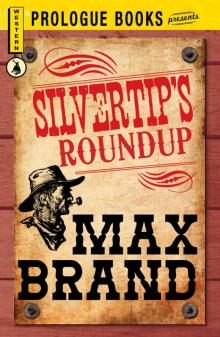 Silvertip's Roundup
Silvertip's Roundup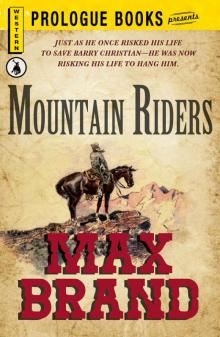 Mountain Riders
Mountain Riders Silvertip (1942)
Silvertip (1942)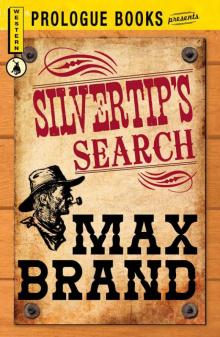 Silvertip's Search
Silvertip's Search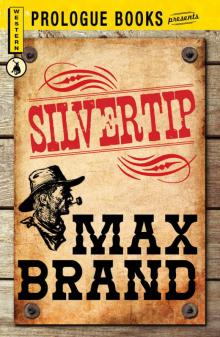 Silvertip
Silvertip Bull Hunter
Bull Hunter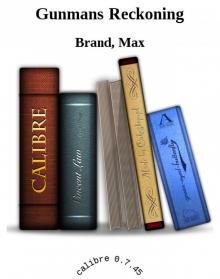 Gunmans Reckoning
Gunmans Reckoning The Seventh Man
The Seventh Man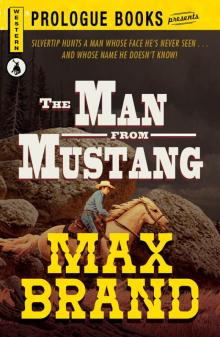 Man From Mustang
Man From Mustang Riders of the Silences
Riders of the Silences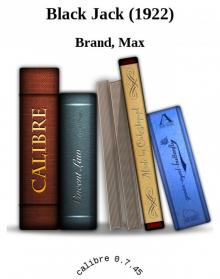 Black Jack (1922)
Black Jack (1922) Way of the Lawless
Way of the Lawless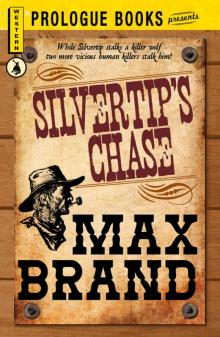 Silvertip's Chase
Silvertip's Chase Trailin
Trailin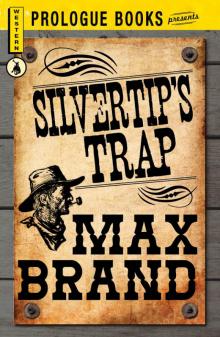 Silvertip's Trap
Silvertip's Trap Ronicky Doone (1921)
Ronicky Doone (1921) The Night Horseman
The Night Horseman the Garden Of Eden (1963)
the Garden Of Eden (1963)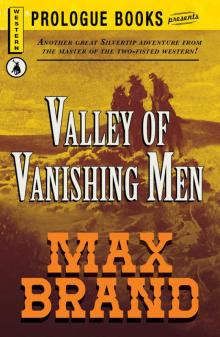 Valley of the Vanishing Men
Valley of the Vanishing Men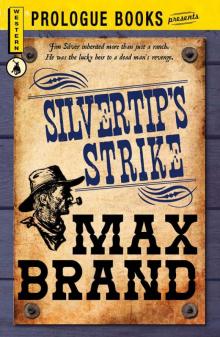 Silvertip's Strike
Silvertip's Strike Black Jack
Black Jack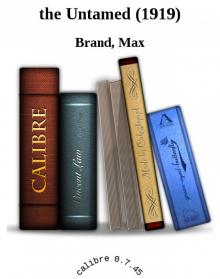 the Untamed (1919)
the Untamed (1919) Way Of the Lawless (1921)
Way Of the Lawless (1921) The Untamed
The Untamed